13 Best Rank Tracking Tools For 2024 (Comparison)
Looking for the best rank tracking tools on the market? You’re in the right place.
If you want to win at SEO, it’s important to keep a close eye on your keyword ranking positions. After all, the search engine results pages are notoriously volatile.
And the best way to do that is with the help of rank tracking software. Rank trackers constantly monitor the search results for you and alert you whenever there’s a change in your ranking position for any of your target keywords, in any location.
In this post, we’ll be reviewing and comparing some of the best rank tracking tools available this year.
The best SERP tracking tools – comparison
TL;DR:
- SE Ranking – Best overall.
- Mangools – Best for beginners.
- Nightwatch – Best for agencies.
- Wincher – Most affordable.
#1 – SE Ranking
SE Ranking is our overall top pick. It’s a feature-rich platform that comes with one of the most accurate and powerful rank trackers on the market, as well as lots of other tools to help you improve your ranking positions like site auditing, keyword research, and backlink tracking.
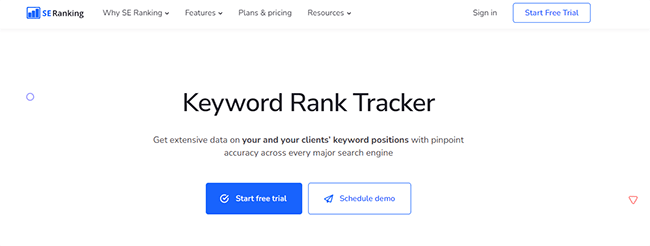
With SE Ranking, you can track rankings at both the national level (e.g. US) and local level (e.g. New York), across all the major search engines (Google, Yahoo!, Bing, YouTube, etc.)
It’s super easy to get started and I like that you don’t have to manually enter all the keywords you want to track.
All you have to do is connect your domain and SE Ranking will analyze it to figure out what terms/phrases you’re already ranking for, then offer them up as keyword suggestions. You can also import keywords in bulk from Google Analytics or a CSV file.
Once you’ve added your keywords and chosen the search engine, country, and location you want to track them in, you can open up your ranking report to view all sorts of insights.
You’ll be able to see your exact ranking positions for each keyword at any given time and how they’ve changed over the last few days/weeks/months. Plus, see at a glance what SERP features you’re ranking for, the average search volume of each of your ranked keywords, a visualization of your top SERP competitors, and lots of other useful stuff.
I also like that you can zoom out to see overview metrics for all your ranked keywords at once, like your overall search visibility score, overall ranking position, and the SERP distribution of your top posts.
Users with large websites that rank for lots of keywords will appreciate the ability to group keywords together and tag them. This makes it much easier to manage bulky projects.
SE Ranking’s ranking data is updated every day, 3 days, or week depending on your plan. But if you need to check rankings in real-time, you can use the Recheck Data button for an instant update.
Key features
- Daily keyword ranking updates. Keep a close eye on where you are in the SERPs for all your target keywords with precise daily ranking updates.
- Detailed ranking reports. View and share detailed reports with lots of insights about your performance in the SERPs.
- Competitor rank tracking. Track the keywords your competitors are ranking for alongside your own and see how you stack up against them.
- Other features. SE Ranking also comes with lots of other tools to help you boost your average ranking positions, including an on-page SEO checker, backlink checker, website audit tool, and more.
Pros and cons
Pricing
Plans start at $55/month, get 20% off with yearly billing. Get started with a 14-day free trial.
Read our SE Ranking review.
#2 – Mangools
Mangools is the best rank tracking tool for beginners. It’s very easy to use with a simple and clean UI, but the tradeoff is that it lacks some of the more advanced features you get with tools like SE Ranking.
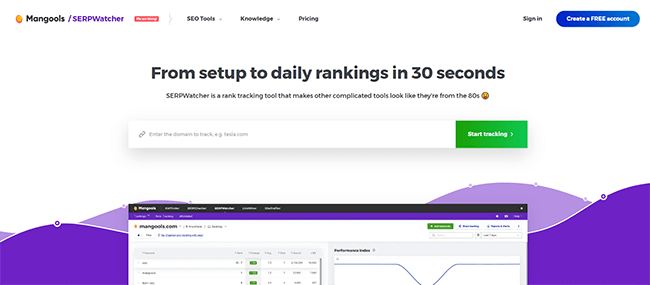
Mangools actually comes with five different tools in one platform: SERPWatcher, SERPChecker, KWFinder, LinkMiner, and SiteProfiler.
SERPWatcher is the rank tracking too, and it couldn’t be easier to use. Just enter the domain you want to track, then choose the location you’re interested in and whether you want to track rankings on desktop or mobile.
Next, add the keywords you want to monitor. You can either type them out one by one or, to save time, import a file or pull them in from KWFinder.
KWFinder is Mangools’ built-in keyword research tool, and I love the way it’s seamlessly integrated with SERPWatcher so once you’ve found keywords you want to target, you can’t start tracking them in one click.
If you have a super long list of keywords to track, it can take up to 30 minutes for Mangools to initially pull the data. But if you only have a few dozen, it should only take a minute or so.
Once the data is ready, you can open the beginner-friendly report to see your ranking position for each keyword, as well as things like position changes, search volume estimations, keyword position flow and distribution, top gainers and losers, and more.
Mangools’ SERPWatcher is also one of the only rank trackers I’ve tried that tells you your Visibility Index score in its tracking report. It’s a metric that measures the visual dominance of your keywords based on how much of the SERP real estate they cover and their position.
Key features
- SERPWatcher. Use Mangools rank tracking tool SERPWatcher to get daily updates on your search positions, and analyze your performance with in-depth ranking reports.
- Email alerts. Receive alerts by email to notify you of sudden, significant ranking changes so you can take action to rectify the problem.
- KWFinder. Discover keyword opportunities and ideas, then add those you want to target to SERPWatcher to start tracking their rankings.
- SERPChecker: Find out which sites are ranking in the SERPs for any keyword and analyze the competition with detailed SERP analysis reports.
Pros and cons
Pricing
Free plan available. Paid plans start from $29/month, save 35% with yearly billing.
Read our Mangools review.
#3 – Nightwatch
Nightwatch is the best rank tracking tool for agencies. It’s loaded with features that agencies need like white-label reporting, API access, and scalable pricing plans.
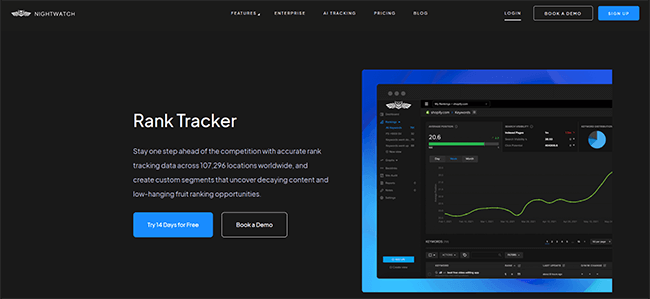
One of the reasons I recommend Nightwatch to agencies is that it’s super scalable. You can customize your subscription plan by choosing exactly how many keywords you want to track, so you don’t pay for more than you need. And as you get more clients and need higher limits, you can scale up.
If your agency caters to local businesses, you’ll also appreciate Nightwatch’s sophisticated local rank-tracking capabilities. You can monitor rankings in 107,296 locations down to the ZIP/post code level.
In addition to your current and best ranking positions, ranking reports also show you things like keyword search volumes, click potential, ranking evolution, etc. And all the data it provides is super accurate.
Key features
- Advanced local rank tracking. Monitor your rankings in over a hundred thousand locations with pinpoint precision.
- Track SERP features. Keep track of the SERP features you’ve earned for each keyword and uncover opportunities for expanding your site’s visibility in the SERPs.
- White-label reports. Automatically create ranking reports with your agency branding to impress your clients.
- API access. Connect Nightwatch to all the platforms and tools you already use with a developer-friendly API.
Pros and cons
Pricing
Plans start from $39/month, discounts are available when you pay yearly. Get started with a 14-day free trial.
#4 – Semrush
Semrush is an all-in-one platform that comes with a whole suite of SEO tools, including a superb rank tracker, and it doesn’t come cheap. It’s one of the most expensive tools on this list but you get a lot for your money.
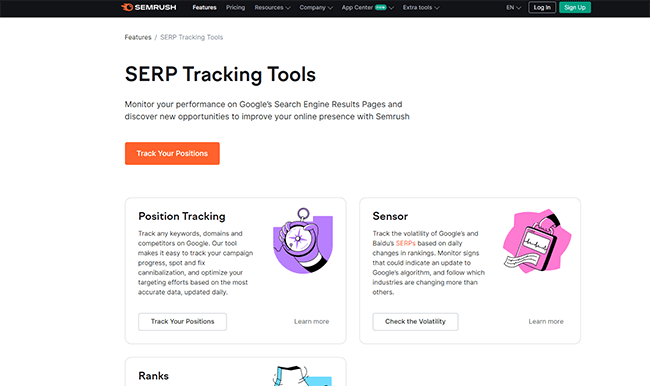
Because Semrush is such a feature-rich platform, the dashboard is a little intimidating. There are lots of different tools and reports to choose from, and the UI is a bit cluttered.
If you just want to track rankings, you’ll want to open up the Position Tracking tool. Then, enter your domain and the keywords you want to track, and choose your location, device type, etc.
In your ranking report, you can see accurate, up-to-date information about the ranking position, SERP visibility, estimated traffic, and share of voice for all your tracked keywords. Plus, find out which sites you’re competing with in the SERPs.
I like that you can set up custom alerts and choose exactly when you want Semrush to notify you of position changes. For example, you might choose to receive alerts when a keyword moves 5+ places, 10+ places, etc.
Another cool feature: Semrush lets you know which SERP features each keyword has earned. SERP features are unique visual elements that take up a lot of real estate on the SERPs, like snippets, knowledge panels, review ratings, FAQs, etc.
In addition to the Position Tracking tool, Semrush also comes with 40+ other SEO tools for things like keyword research, competitive research, link building, on-page optimization, and more. Together, it has everything you need to dominate on the SERPs.
Key features
- Position tracking. Monitor keywords to track your average ranking position, as well as your SERP visibility, share of voice, and more.
- Custom alerts. Set up custom alerts that notify you when your ranking position changes by a specified amount.
- 40+ SEO tools. Use Semrush’s huge suite of search engine optimization tools to optimize your site and improve your ranking potential.
Pros and cons
Pricing
Free version available. Paid plans start from $129.95/month, and save up to 17% when you pay annually.
Read our Semrush review.
#5 – Wincher
Wincher provides better value for money than most other rank tracking tools, with affordable monthly subscription plans and generous usage limits.
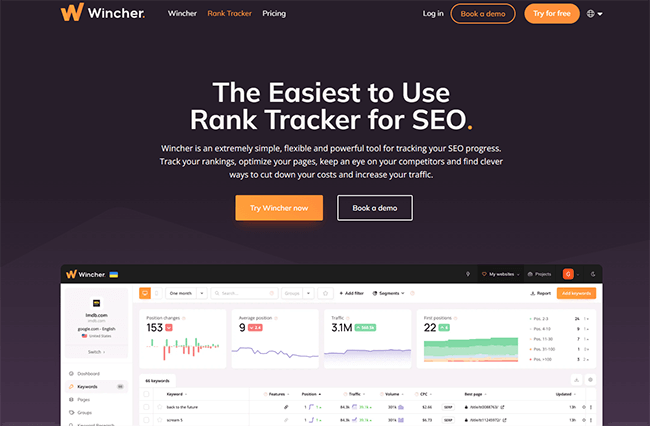
On the surface, Wincher’s rank tracker doesn’t seem that much cheaper than its competitors—the starting price is in a similar ballpark.
But when you factor in the fact that every plan comes with unlimited users and up to 24 months of historical ranking data, it’s clear that it’s superb value for money.
Once you’ve signed up, you can start tracking keywords globally and locally, with a bird’s eye view of how you’re ranking and what you can do to improve.
In Wincher’s ranking reports, you’ll be able to see the position of all tracked keywords in the SERPs, as well as their traffic, search volume, CPC, and more. You can also monitor your competitors’ keywords and get notified whenever there’s a change you need to know about.
Key features
- Global and local rank tracking. View your average ranking position for any keyword, as well as other useful insights.
- Competitor rank tracking. Monitor competitor domains to keep track of their rankings and uncover strategic insights.
- Keyword research. Find new words and phrases to target and track
Pros and cons
Pricing
Plans start from $39/month, get 2 months free with yearly billing. Get started with a free trial.
Read our Wincher review.
#6 – AccuRanker
AccuRanker is one of the fastest and most accurate rank trackers on the market. It’s a little pricey, but it has some fantastic features including instant, on-demand ranking updates.
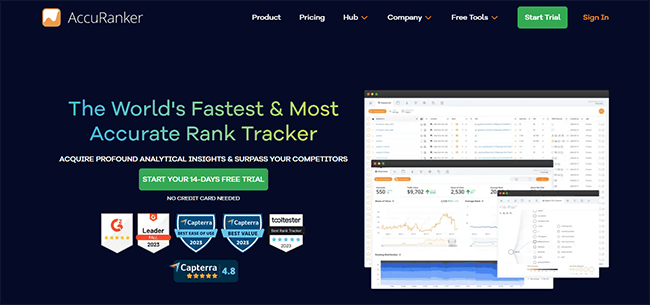
AccuRanker can track rankings globally and locally across multiple search engines including Google, Bing, and Yandex. And its reports are super detailed.
When you sign up, you get to choose how many keywords you want to track. The higher the limit, the higher the price, and you can upgrade/downgrade at any time. This is great for agencies that need to scale their allowances up or down depending on how many clients they’re managing.
However, it’s less suitable for users who only need to track a small number of keywords as the minimum plan allowance is 1000 keywords/month (hence why the starting price is so high), so you’ll end up paying for more than you need.
Key features
- Accurate rank tracking. Track your rankings locally or globally with superb accuracy.
- On-demand updates. Get updates on-demand in a couple of clicks
- Integrations. Connect AccuRanker to third-party tools like Google Analytics, Databox, Google Search Console, and more.
Pros and cons
Pricing
Plans start from $129/month, discounts are available with yearly billing. Get started with a 14-day free trial.
#7 – SEO PowerSuite
SEO PowerSuite is unique in this list in that it’s the only rank tracker that runs in the desktop, rather than in a browser-based app. It’s incredibly affordable and comes with some powerful features you won’t find elsewhere.
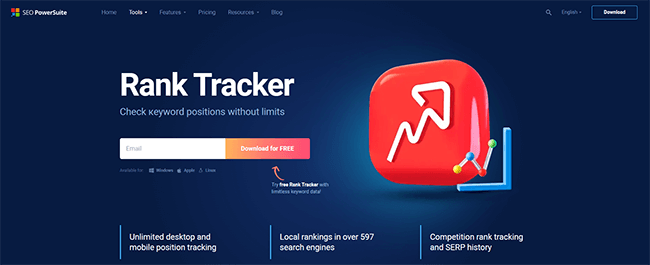
I don’t particularly like that SEO PowerSuite runs on desktop as it takes time to download, and if you’re running lots of other desktop apps at the same time, the performance can be sluggish—but it definitely has its benefits.
For example, you can view your ranking reports while offline (though you’ll need an internet connection initially to pull the data in).
It’s much, much better value for money than browser-based rank trackers too. You can track unlimited keywords even with the free license (yes, I said free) and its yearly professional license is very affordable.
I also like how comprehensive its rank tracker is. It doesn’t just check Google like lots of other tools, but hundreds of different search engines. You can get really granular with your settings and check rankings in specific locations and verticals.
Aside from its Rank Tracker tool, SEO PowerSuite also offers several other SEO tools: LinkAssistant, Website Auditor, and SEO SpyGlass. These tools can help you research your competitors, audit your site, and build backlinks.
Key features
- Comprehensive rank tracker. Track your rankings across all search engines from SEO PowerSuite’s desktop app.
- Unlimited keywords. Never worry about exceeding allowances with unlimited keyword tracking on all plans.
- Other SEO tools. Build backlinks, audit your website, spy on your competitors, and more.
Pros and cons
Pricing
Free version available. Paid licenses start from $199/year.
Read our SEO PowerSuite review.
#8 – Advanced Web Ranking
Advanced Web Ranking is a dedicated tool for rank tracking, SERP analysis, and SEO reporting.
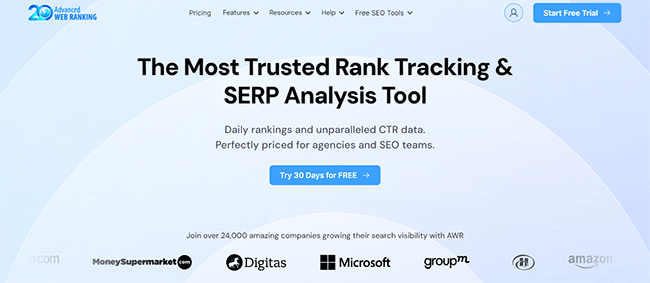
It supports more search engines than most: You can track keyword rankings on Google, Yandex, Baidu, DuckDuckGo, YouTube, Amazon, Naver, and thousands of other niche platforms.
Rankings are updated daily, and you can also manually update them on demand. This comes in useful if you’ve just updated and optimized a piece of content and you want to see if it’s moved the needle, or if Google’s just rolled out an algorithm update and you want to make sure it hasn’t changed anything.
If you’re trying to rank locally, you can narrow down search results to specific countries, cities, and even GPS coordinates.
And the reports are super detailed. You don’t just get position data, but also exclusive CTR data, search visibility KPIs, and SERP feature analysis.
Agencies will appreciate that you can have unlimited projects, users, and reports at no extra cost.
Key features
- Cross-engine rank tracking. Track your keywords across thousands of search engines including Google, YouTube, Baidu, Yandex, and more.
- On-demand and daily updates. Get updated keyword position information every day or request it on-demand.
- Competitor analysis. Perform in-depth market research into your rivals’ organic search strategies.
Pros and cons
Pricing
Plans start from $99/month, save 10% with annual billing. Get started with a 30-day free trial.
#9 – Authority Labs
Authority Labs is another dedicated rank tracking tool for Google, Bing, and Yahoo. It offers white-label reporting and unlimited users for no extra cost, making it a good choice for marketing agencies.
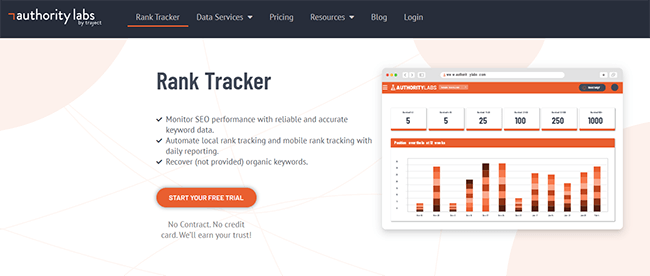
Authority Labs gives you reliable and accurate data for all your keywords. Just enter the domains you want to monitor and choose the keywords you want to check.
If you want, you can check local rankings by specifying the state, city, or postcode, or leave it set to global. Reports are updated every day so you’ll know as soon as any of your keyword positions change.
I like that you can track competitor domains alongside your own in Authority Labs. It can help you gather insights that give you an edge in your industry.
I also like that it integrates with Google Data Studio, so you can export your keyword ranking data and blend it with data from other tools like Google Analytics or Search Console to build comprehensive SEO reports.
Key features
- Rank tracking. Track where you’re ranking on search engines including Google, Bing, and Yahoo.
- Google Data Studio integration. Export your ranking data into GDS for advanced reporting.
- Competitor tracking. Monitor your rivals’ keyword performance alongside your own.
Pros and cons
Pricing
Plans start from $49/month. Get started with a 14-day free trial.
#10 – MorningScore
MorningScore is one of the most unique keyword rank trackers in this list. It’s the only one that gamifies the process of getting your keywords to rank on Google through ‘SEO missions’.
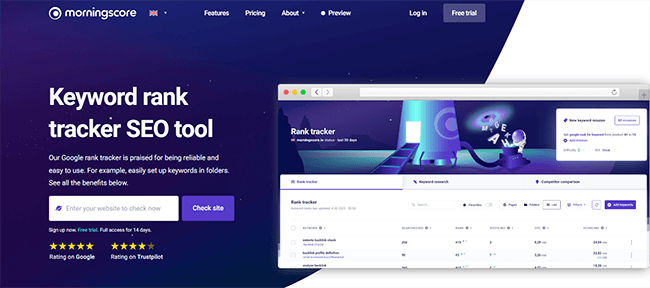
On the surface, Morningscore’s rank tracker is just like any other. You enter the keywords you want to track and choose a location, and it gives you daily updates on your Google ranking position for each of them, as well as other metrics like the number of visits and searches each keyword provides.
You can also see how your competitors stack up in the SERPs, discover new keyword opportunities, and do lots of other stuff.
But what makes Morningscore special is its SEO missions feature. It motivates you to work on tasks that will have the biggest impact on your Google rankings by giving you a checklist of things to do.
As you complete tasks, you’ll earn XP and ‘level up’—both on the app and in the SERPs. The more difficult the task, the greater the reward.
An example of a mission might be ‘get [this keyword] from position 12 to 4’. To help you achieve that, you can use Morningscore’s other SEO tools. For example, use the link scanner to strengthen your link profile, and the health checker to find and fix issues that may be holding you back.
Key features
- Rank tracker. Monitor your keyword ranking positions daily and compare them to your competitors.
- Keyword discovery. Discover new keywords you might want to target with Morningscore’s keyword research tools, then add them to your tracking list.
- SEO Missions. Stay motivated to keep improving your ranking positions with a gamified checklist of SEO tasks to complete.
- Other tools: Track your backlinks, report on your SEO performance, conduct website audits, and more.
Pros and cons
Pricing
Plans start from $65/month, get 2 months free when you pay annually. Get started with a 14-day free trial.
#11 – Serpstat
Serpstat is another feature-rich platform that comes with a rank tracker, as well as lots of other tools to help with SEO.
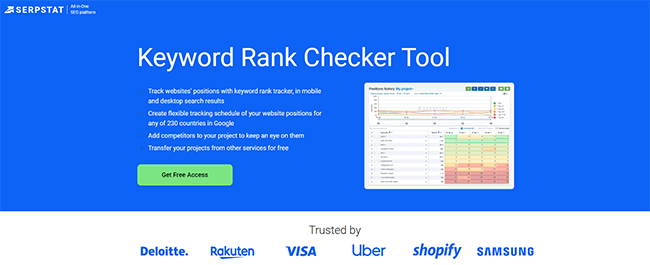
You can track both organic and paid search results with Serpstat, globally or in specific countries.
In your ranking reports, you’ll be able to see your current ranking positions as well as historical data to evaluate changes over time. The report also tells you the SERP features you rank for, and the estimated monthly search volume of each keyword.
I like that you can group keywords together as it makes it easier to manage large projects. And it’s nice to be able to automate reporting with daily, weekly, or monthly reports.
Aside from keyword tracking, Serpstat also comes with other tools for SEO reporting including site auditing, competitor research, keyword research, and backlink analysis.
Key features
- Keyword rank checker. Track where you rank for keywords locally and globally and generate detailed reports
- Keyword research. Discover and analyze keywords for your SEO and PPC campaigns
- Site auditing. Find issues that may be hurting your rankings and fix them
- Competitor analysis. See how you stack up against your competitors with insights into their search engine rankings and SEO strategy
Pros and cons
Pricing
Plans start from $59/month, discounts are available when you pay yearly. Get started with a 7-day free trial.
#12 – Google Search Console
Google Search Console is probably the best free rank tracking tool on the market. It’s designed to help webmasters analyze, monitor, and improve their search performance.
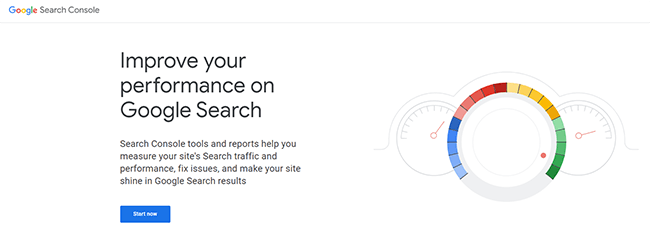
Once you’ve connected your website to Search Console, you can open the Performance report to see all the keywords you’re currently ranking for and your average ranking position for each of them.
Because the data comes directly from Google, you know it’s 100% accurate and reliable. And unlike other rank trackers, you can also see exactly how many impressions and clicks each of your ranked keywords has had in your chosen frame, which is great.
There are lots of other things you can do in Google Search Console aside from tracking your keyword rankings.
For example, you can identify and fix indexing errors, submit sitemaps and updated content to get your pages/posts to rank faster, check your Core Web Vitals and Page Experience metrics to find out if anything is holding you back from ranking higher, and more.
Not bad considering it’s totally free, huh? So what’s the catch?
Well, unlike paid rank trackers, you can’t track keyword rankings for any site—it has to be a site you own (and you’ll need to validate site ownership before you can access your data).
The other big drawback is that you can only track your average ranking positions globally. You can’t track rankings in specific geological locations, which is a big deal if you’re focusing on local SEO. And of course, you can’t track your rankings on other search engines like Bing or YouTube either.
Bonus tip: Google Search Console can often find keywords that are driving lots of traffic to your site, but that you aren’t targeting. Use these content optimization tools to optimize your content around them and increase your average ranking position.
Key features
- Search results tracking. View your Performance report to see your average ranking position for all the keywords you rank for.
- Clicks and impressions tracking. See how many clicks and impressions each ranked keyword has had in any date range.
- Indexing tool. Check for indexing issues that may be preventing your posts/pages from ranking and fix them.
- Experience report. Check your Core Web Vitals, Mobile Usability, and Page Experience metrics to identify areas for improvement that could help you rank higher on Google.
Pros and cons
Pricing
Google Search Console is completely free to use.
#13 – Whitespark
Whitespark is one of the best local rank tracking tools. It’s a good choice for businesses focusing on local SEO who want to keep track of how they’re ranking in a specific area.
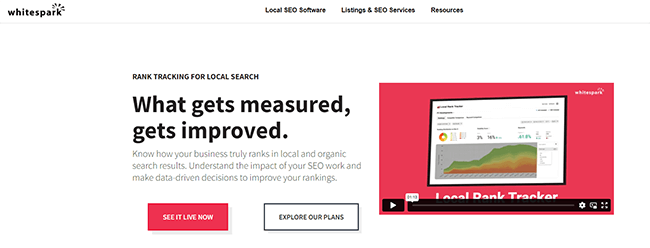
Most rank trackers let you monitor rankings in specific countries and cities, but Whitespark goes one step further than that.
You can drill right down to hyper-specific locales and track rankings at the zip/postal code level. You can even enter specific geo-coordinates for pinpoint accuracy.
It doesn’t just track organic search results either, but also local packs and maps across Google and Bing.
I like how you can segment your data by location to see which specific areas you’re ranking well in and compare search performance across multiple locations.
The competitor comparison tool is pretty neat too. It allows you to compare your rankings across different keywords and locations with your competitors, so you can see where in the world you’re outranking them, and where they’re outranking you.
Whitespark also comes with other tools that local businesses and marketers will appreciate, including a local citation finder (building citations can help boost your rankings), a review checker and generator, and Google Business Profile management tools.
Key features
- Local rank tracking. Track your organic rankings, local packs, and maps in any location with pinpoint precision
- Competitor comparison. Compare your rankings to your competitors in different locations
- Other tools for local businesses. Improve your local visibility and optimize your site with tools to help you build citations, manage reviews, and more.
Pros and cons
Pricing
Plans start from $25/month. Get started with a free trial.
Final thoughts
That concludes our comparison of the best rank trackers for this year.
All of the tools we’ve looked at can be used to monitor your keyword ranking positions in Google. The right choice for you will depend on the specific features you’re looking for.
For example, do you need to track rankings at the local level? Do you want a dedicated rank tracker that integrates with your existing SEO stack, or would you prefer an all-in-one solution? Will you be working alone or with a team? How many keywords do you need to track per month, and what’s your budget?
These are the kinds of questions you’ll need to think about when weighing up your options.
You can find more tools that offer rank tracking and more in our roundup of the best Ahrefs alternatives. You might also want to explore our roundup of SEO statistics, and check out these content writing tools that can help you rank higher on Google.
Disclosure: Our content is reader-supported. If you click on certain links we may make a commission.
